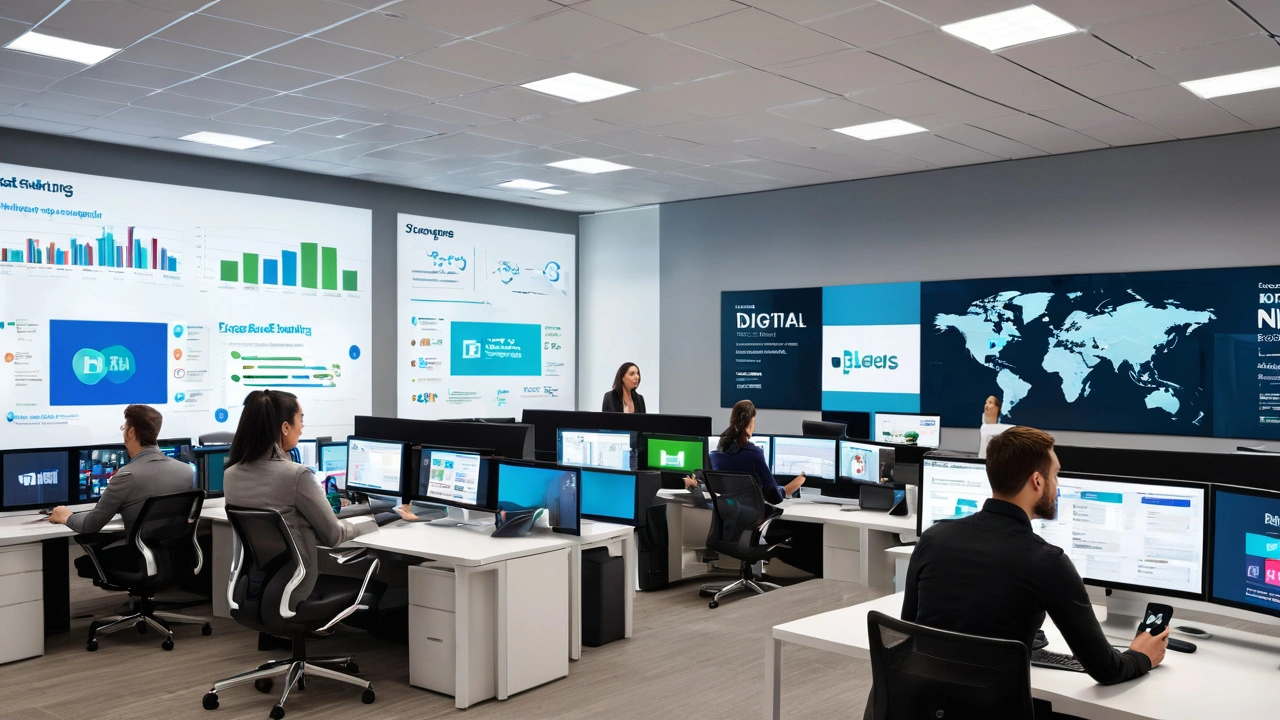In today's fast-paced world, businesses are constantly seeking innovative ways to reach their target audiences and drive growth. One of the most powerful tools at their disposal is internet marketing. No longer confined to traditional marketing methods, businesses can now leverage the internet to engage with customers in new and exciting ways.
Thanks to the rise of the internet, companies have unprecedented access to a global market. With the right strategies, it's possible to connect with potential customers across various online platforms, creating opportunities that were previously unimaginable.
Moreover, internet marketing allows for a high degree of personalization. Businesses can tailor their messages to individual preferences, enhancing customer engagement and building stronger relationships. This level of customization can significantly improve customer satisfaction and loyalty.
The cost-effectiveness of internet marketing is another undeniable benefit. Compared to traditional advertising methods, online campaigns can be much more affordable while reaching a broader audience. This makes it easier for businesses of all sizes to compete on a level playing field.
Real-time data and analytics are game-changers in the marketing world. With the ability to monitor and adjust campaigns instantly, businesses can optimize their strategies for maximum impact. This agility allows companies to stay ahead of the curve and respond quickly to changing market conditions.
As technology continues to evolve, so will internet marketing. Emerging trends such as artificial intelligence and virtual reality are set to transform the way businesses connect with their audiences. Staying informed about these developments will be crucial for any business aiming to thrive in the digital age.
- The Rise of Internet Marketing
- Personalization and Customer Engagement
- Cost-Effective Advertising Solutions
- Real-Time Data and Analytics
- Future Trends in Internet Marketing
The Rise of Internet Marketing
In the last two decades, the business landscape has changed dramatically, with the advent of internet marketing playing a key role in this transformation. Prior to the digital revolution, companies relied heavily on traditional marketing methods such as print ads, TV commercials, and radio spots. While effective, these methods had limitations, especially in terms of reach and engagement. The internet has lifted these barriers, opening up a world of opportunities for businesses to connect with their audience in ways that were once unimaginable.
One of the most significant factors driving the rise of internet marketing is the exponential growth in internet accessibility. According to the International Telecommunication Union, over 5.3 billion people were using the internet by the end of 2023, representing around 66% of the global population. This vast number of users provides an incredible platform for businesses to promote their products and services to a global audience.
The emergence of social media platforms has also been a game-changer. With billions of users on platforms like Facebook, Instagram, Twitter, and LinkedIn, businesses can target their marketing efforts with remarkable precision. Social media not only offers an avenue for advertising but also a space for engaging with customers, building communities, and fostering brand loyalty. According to a 2023 survey by Statista, 91% of U.S. marketers reported that social media campaigns had increased their brand's exposure.
"We are witnessing an era where the digital landscape is evolving at a staggering pace, offering businesses untold opportunities to connect with their audience." - Neil Patel, digital marketing expert
Search engines have played a pivotal role in the rise of internet marketing. Google, the world’s most popular search engine, processes around 8.5 billion searches per day. Businesses have harnessed the power of search engines through Search Engine Optimization (SEO) and pay-per-click (PPC) advertising to increase their online visibility. Effective use of SEO techniques helps businesses rank higher on search engine results pages, making it easier for potential customers to find them. Additionally, PPC campaigns offer a cost-effective way to attract targeted traffic to a website.
Email marketing is yet another powerful tool in the realm of internet marketing. Unlike traditional mail campaigns, email marketing is cost-effective, instant, and can be highly personalized. Businesses can use email marketing to send newsletters, promotional offers, and personalized recommendations directly to their subscribers' inboxes. According to HubSpot, segmented email campaigns can result in a 760% increase in revenue, showcasing the effectiveness of this marketing method.
Moreover, the rise of e-commerce platforms such as Amazon, eBay, and Shopify has revolutionized the way consumers shop and businesses sell their products. These platforms offer businesses a convenient and efficient way to reach a global audience. The global e-commerce market was valued at $6.3 trillion in 2023 and is projected to grow at a significant pace, highlighting the shift towards online shopping.
| Year | Global Internet Users (in billions) |
|---|---|
| 2000 | 0.413 |
| 2010 | 1.933 |
| 2023 | 5.3 |
In conclusion, the rise of internet marketing signifies a paradigm shift in the business world. The digital age has brought with it tools and platforms that enable businesses to reach a broader audience, engage with customers on a personal level, and track the performance of their marketing efforts in real time. As technology continues to evolve, so too will the strategies and methods that make up internet marketing, offering exciting new possibilities for businesses to explore.
Personalization and Customer Engagement
One of the standout features of internet marketing is its ability to personalize experiences for individual users. This customization is not just a luxury—it's an expectation among modern consumers. They want brands to understand their needs, preferences, and behaviors. Personalization can take many forms, from tailored email campaigns to targeted advertisements on social media platforms.
Take Amazon, for example. Their recommendation algorithm is a perfect illustration of personalized marketing. By examining past purchase history and browsing behavior, Amazon suggests products that align with a customer's interests. This not only improves the shopping experience but also drives more sales. In fact, it's estimated that personalized product recommendations account for 35% of Amazon's revenue.
Personalization extends beyond product recommendations. Email marketing is another area where customization can significantly impact customer engagement. Emails that address recipients by their first name, reflect their past interactions with the brand, and offer relevant promotions are more likely to be opened and acted upon. A study by Campaign Monitor found that personalized subject lines can increase open rates by 26%.
Social media platforms also offer robust tools for personalization. Through sophisticated algorithms, businesses can deliver content that resonates with individual users. This targeted approach ensures that marketing efforts are not wasted on disinterested audiences. Brands can create more meaningful engagements by posting content that directly relates to the interests and behaviors of their followers.
Despite these advantages, it's crucial for businesses to strike the right balance. Too much personalization can lead to privacy concerns. Users may feel uncomfortable if they perceive that a company knows too much about them. Transparency is key here. Brands should be open about how they collect and use data, ensuring that users feel respected and secure.
Effective personalization requires robust data collection and analysis. Businesses need to gather information from various touchpoints, including website interactions, purchase history, and social media activity. This data must then be analyzed to uncover trends and insights that can inform personalized marketing strategies. Utilizing customer relationship management (CRM) systems can streamline this process, making it easier to track and analyze customer data.
"People do not buy goods and services. They buy relations, stories and magic," said Seth Godin, a well-respected marketer and author. This quote underscores the importance of personalization. It's about creating a connection, a story that resonates with the customer.
One interesting development in the world of personalization is the use of artificial intelligence (AI). AI can analyze vast amounts of data quickly and accurately, enabling businesses to deliver highly personalized experiences in real-time. Chatbots powered by AI can engage with customers 24/7, answering questions and providing recommendations based on individual preferences.
Whether it's through AI or more traditional methods, personalization is a powerful tool in internet marketing. It helps businesses stand out in a crowded marketplace, fosters customer loyalty, and drives sales. By effectively leveraging data and staying transparent, businesses can create customized experiences that resonate deeply with their audience.

Cost-Effective Advertising Solutions
Reaching your target audience doesn't always have to burn a hole in your pocket. The beauty of internet marketing lies in its cost-effectiveness. Small businesses, for instance, often struggle with advertising budgets, but the digital world offers them numerous options that are both affordable and effective. Platforms like Google Ads and Facebook Ads allow businesses to set a budget that aligns with their financial capabilities. This means you no longer need a massive budget to make a significant impact.
A major advantage of these platforms is their granular targeting options. On social media, you can narrow down your audience by age, location, interests, and behaviors. This ensures your ad dollars are spent more wisely, reaching potential customers who are more likely to convert. Google Ads, on the other hand, leverages search intent, placing your ads in front of users actively searching for your products or services. By focusing on the most relevant audience, you increase your return on investment significantly.
The flexibility of online advertising campaigns is another cost-saving element. You can pause, adjust, or stop your campaigns at any moment based on their performance. Traditional media like TV or print ads don't offer this level of control. This ability to swiftly adapt your campaigns helps you allocate your budget more effectively, ensuring you only invest in strategies that yield results.
According to a study by HubSpot, “92% of small business owners believe that digital marketing is crucial to their survival and growth.”This statistic highlights how vital affordable online marketing strategies have become for businesses today. Additionally, the data-driven nature of online advertising offers transparency, providing you with insights into what works and what doesn't. You can track metrics like click-through rates, conversion rates, and overall engagement in real-time.
One often overlooked benefit is the capacity for retargeting. When a user visits your site but doesn’t make a purchase, retargeting ads remind them of your products, encouraging them to return and complete their purchase. These ads are proven to be highly effective because they target individuals who have already shown interest in your offerings. According to AdRoll, retargeting can boost conversion rates by up to 50%, illustrating how impactful this strategy can be.
Influencer marketing is another cost-efficient strategy, especially for reaching niche markets. Collaborating with influencers can be much more affordable than traditional celebrity endorsements and can provide higher engagement rates. Influencers usually have a dedicated follower base that trusts their opinions, making their recommendations more likely to result in purchases.
Email marketing remains one of the most cost-effective strategies, boasting an average ROI of $42 for every $1 spent. Personalized email campaigns can keep your audience engaged and informed about new products, promotions, or company updates. By segmenting your email lists, you can tailor your messages to different customer groups, making your communication more relevant and effective.
The world of internet marketing offers a plethora of options that can fit any budget. From social media ads to email campaigns, the key is to find the strategies that work best for your business and continually optimize them for better performance. By leveraging these cost-effective solutions, businesses can achieve their marketing goals without overspending.
Real-Time Data and Analytics
Businesses today thrive on information, and the key to harnessing this power lies in real-time data and analytics. This crucial aspect of internet marketing allows companies to gather, process, and interpret data as it happens. Unlike traditional methods that involve long wait times and often outdated information, real-time analytics provide businesses with the ability to make instant decisions based on the most current data available.
At the heart of real-time analytics is the ability to track user interactions across various digital platforms. Whether it's a website visit, a social media click, or an email open, the data is captured and analyzed immediately. This immediacy is invaluable for marketers, allowing them to understand customer behavior and preferences on the fly. Consider an online retailer who can adjust their promotional offers based on real-time purchasing patterns, effectively maximizing sales in a matter of hours or even minutes.
Moreover, real-time analytics enable businesses to employ dynamic personalization strategies. By understanding individual user behavior, companies can tailor their messaging and offers to better suit each customer. This leads to improved user experiences, higher engagement rates, and ultimately, increased customer loyalty. For example, Netflix uses real-time data to recommend shows and movies based on a viewer's past behavior, providing a highly personalized experience.
Another significant benefit of real-time analytics is the ability to monitor and respond to market trends swiftly. By analyzing data as it comes in, businesses can identify and capitalize on emerging trends before their competitors. This competitive edge is crucial in today's fast-paced business environment. For instance, during a promotional campaign, a company can adjust its advertising spend based on immediate feedback, ensuring optimal performance and ROI.
The real-time aspect also extends to problem-solving. Should an issue arise, such as a sudden drop in website traffic or a spike in negative social media comments, real-time analytics allow businesses to identify and address the problem promptly. This proactive approach helps to mitigate potential damage and maintain a positive brand reputation. A famous quote from Peter Drucker encapsulates this well:
"What gets measured gets managed."
Localytics reported that businesses utilizing real-time analytics see a 56% increase in operational efficiency. This remarkable figure underscores the competitive advantage provided by real-time data. Companies no longer need to rely on guesswork or outdated reports; instead, they can base their decisions on the freshest data available. This ensures strategies are data-driven and highly effective.
Real-time analytics are powered by advanced technologies, such as big data platforms, machine learning algorithms, and cloud computing. These technologies enable the swift processing and visualization of large data sets, making insights easily accessible to decision-makers. For businesses, this means a lower barrier to entry and an increased ability to leverage data without significant upfront investment.
The importance of real-time data and analytics cannot be overstated in today's business landscape. This powerful tool offers businesses a real-time pulse on their operations, market conditions, and consumer behaviors. Leveraging this information allows for more precise, personalized, and effective marketing strategies, ultimately driving growth and success in an ever-competitive marketplace.

Future Trends in Internet Marketing
As we venture deeper into the digital age, several key trends are poised to reshape the landscape of internet marketing. One of the most transformational elements is the rise of artificial intelligence (AI). AI is revolutionizing how businesses approach marketing by enabling highly personalized customer interactions. With AI, companies can analyze vast amounts of data in real time to predict customer behavior and tailor marketing campaigns accordingly. This not only increases efficiency but also enhances the customer experience.
Another trend gaining traction is the use of virtual reality (VR) and augmented reality (AR). While these technologies are still in their infancy, they promise to create immersive marketing experiences that can capture consumer attention like never before. Imagine a customer virtually trying on clothes or testing a product in a simulated environment before making a purchase. Such experiences can significantly influence buying decisions and boost conversion rates.
The rise of voice search is another key trend. With the increasing popularity of smart speakers and voice-activated assistants like Alexa and Siri, optimizing for voice search is becoming essential for businesses. Voice search alters how content is discovered, emphasizing the importance of long-tail keywords and natural language. Companies that adapt their SEO strategies for voice search will have a competitive edge in reaching their audience effectively.
Blockchain technology is also making waves in internet marketing. Known primarily for its applications in cryptocurrency, blockchain offers transparency and security that can foster trust in digital advertising. By providing an unalterable record of transactions, blockchain can combat ad fraud and ensure advertisers get what they pay for.
Social media continues to evolve, introducing new features and algorithms that impact how brands connect with their audience. Platforms like Instagram, TikTok, and Facebook are focusing more on short-form video content, pushing companies to innovate their content strategies. This shift is driven by changing consumer preferences, with audiences increasingly favoring engaging, easily digestible content. Companies that master the art of short-form video will find themselves ahead in the social media game.
"In the coming years, brands that don't adapt to these technological advancements will find it increasingly difficult to compete," says John Smith, a digital marketing expert.
Lastly, data privacy concerns are reshaping how marketers collect and use consumer data. With regulations like the GDPR and CCPA in place, companies must be more transparent about their data practices. Building trust with consumers through ethical data management will become crucial for long-term success.
In summary, staying ahead of these trends will require businesses to be adaptable and forward-thinking. Embracing AI, VR, AR, voice search, blockchain, evolving social media tactics, and stringent data privacy measures will be key to thriving in the future of internet marketing. By keeping an eye on these developments, businesses can position themselves for sustained growth in an ever-changing digital world.


I'm a Marketing Expert with over a decade of experience in the industry. I specialise mainly in online marketing and have worked with numerous global brands to elevate their online presence, build their brand image, and increase their sales. My passion lies in creating meaningful and engaging campaigns that truly resonate with audiences. In my spare time, I enjoy sharing my knowledge and experiences through my blog where I primarily write about the latest trends and tricks in online marketing.